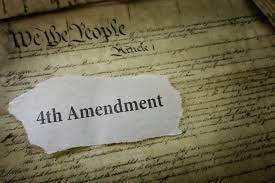I’m a software developer. I deal with databases full of information about people. These databases contain a wealth of information about people that the founders never imagined. In the hands of the government, this information means power — power to intimidate, coerce, and control.
The founders designed the Bill of Rights for the very specific purpose of limiting the power of government. It’s time to limit that power further and make it clear that such databases do not belong to our overlords, but to us.
The difficulty with limiting access to this information has been that it’s hard to craft appropriate legislation, or constitutional amendments, to make it clear what the government can and can’t do. There are tradeoffs, of course. When you prevent the government from accessing information on the good guys, you prevent it from getting information on the bad guys.
But there is an answer in the Fourth Amendment. Several years ago I wrote a proposal (on a now-abandoned blog) for a new amendment that strikes the right balance. I think it’s still a good one. Here’s what I wrote long ago:
We should add a single sentence to the Constitution:
Amendment XXVIII The protections of the Fourth Amendment shall extend to include documents, transactions, and communications held by a fiduciary.
A “fiduciary” is a person or company which holds assets on behalf of another person or company.
For reference, the Fourth Amendment reads:
The right of the people to be secure in their persons, houses, papers, and effects, against unreasonable searches and seizures, shall not be violated, and no Warrants shall issue, but upon probable cause, supported by Oath or affirmation, and particularly describing the place to be searched, and the persons or things to be seized.
The net effect of this amendment is that the government would not be able to obtain emails, bank records, or files stored in the cloud without a warrant. It would protect an individual’s information, and not just their persons, houses, papers, and effects, from unreasonable search and seizure.
The founders never anticipated email, texting, or the cloud, and never anticipated that we would store the most intimate details of our lives online. At the time of the founding such information was stored only on paper or in our heads, and the founders gave explicit protection to both through the Fourth and the Fifth amendments.
Under this amendment any vendor who chose to advertise that they held your data in a “fiduciary” relationship could not be compelled to give it to the government without a warrant. This amendment would not prevent the government from going after terrorists, but it would prevent them from creating PRISM-style databases containing the communications of innocent people.
The purpose of this amendment would be to shift power from the government to the individual. (This is also the purpose of the first ten amendments). This amendment says that the government cannot collect the private information of a U.S. citizen without convincing a judge that it has probable cause to believe that the citizen has violated the law. It also gives the individual recourse via the courts if the government doesn’t adhere to the rules.
A “privacy” amendment of this nature is a good compromise between our need to keep our papers and effects secure and the need of law enforcement to investigate criminals and terrorists.


